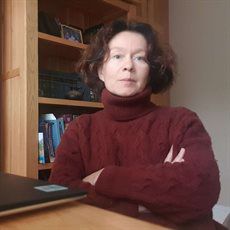The Pervasive Sensing (PSG) Group interests span all areas of radar, signal processing and remote sensing.
We are currently focused on:
- active and passive THz sensing; multistatic radar, specifically FSR;
- radar imaging based on radio-holography, passive coherent location systems;
- radar image processing, algorithms for classification and identification;
- data fusion and registration; electromagnetic modelling of large scale problems, cognitive radar;
- 3D image reconstruction with applications ranging from automotive sensing for future autonomous vehicles to detection, tracking and classification of stealth targets.
Group members
Lead

Chair in Pervasive Sensing
Department of Electronic, Electrical and Systems Engineering
Professor Gashinova is the head of Pervasive Sensing Group within the renowned Microwave Integrated Systems Laboratory, with the international leadership and growing portfolio of research in three main directions:
- Sensing for Vehicle Autonomy
- Sensing for Space Domain Awareness
- Sub-THz sensing
- Telephone
- +44 (0) 121 414 7599
- Email
- m.s.gashinova@bham.ac.uk
Core research staff
- Dr Edward Hoare
- Dr Liam Daniel
- Dr Scott Cassidy
- Dr Sukhjit Pooni
- Dr Alex Bystrov
PhD students
- Emidio Marchetti
- Dominic Phippen
- Wendi Lin
- Ana Stroescu
- Yang Xiao
Application domains (in order of current volume of research)
- Sensors for autonomous vehicles: development of high resolution imaging radar, image processing, data fusion for multi-sensor systems (radar, sonar, lidar and video) and classification.
- THz sensing for autonomous platforms, which was conceived in this group and where we lead globally.
- Defence radar and systems: target detection and classifications, missile guidance, passive technologies for location and guidance, intelligent perimeter protection and multistatic radar imaging.
Current PSG research interests and proposals include:
Multi-feature 3D radar and electro-optical (EO) sensing
This research will support assisted and autonomous platforms including ground vehicles, unmanned airborne and maritime platforms. We have created the concept of a multi-feature sensing suite and formulated core tasks for its development. These include: cognitive radar sensor development, fundamental problems of scattering and propagation in complex environments, development of high resolution imaging radar, image processing, data fusion for multi-sensor systems (radar, sonar, lidar and video) and diverse approaches for classification, including DNN and feature-based classifiers.
Physical modelling and simulation of electro-magnetic phenomena
This work is important for future autonomous platforms, which will share physical space and spectrum allocation.
Radio-holographic radar profile reconstruction in bistatic active and passive systems
This area is a logical continuation of MISL's long-term research on Forward Scatter Radar (FSR), which is expanding to include the following capabilities: passive mode of operation using satellite communication links and classification of unmanned airborne platforms.
Passive radar systems on moving platforms
This research will use space-borne and terrestrial illuminators of opportunity for maritime applications. This is an expansion of PAMIR I/II and GEO SAR projects. A particular focus is on the development of techniques to improve the resolution of current radar systems for localisation and tracking.
Non-optical anonymous imaging
Growing demands for the right to privacy require the development of non-optical anonymous imaging monitoring of workplaces, care homes, etc. We will use our expertise in high-resolution sub-mm wave imaging to create algorithms for 3D location and behavioural pattern recognition, including gesture recognition. We expect this research to include a new direction of multi-disciplinary (healthcare and computer vision) research.
Medical THz imaging
We plan to work on medical THz imaging, where our unique knowledge of the THz signals propagation and scattering, signal processing and image characterisation can bring improved performance. We are in process of surveying potential applications and finding potential stakeholders.
Computer vision and cognitive signal processing for autonomous platforms
We plan to extend our expertise in information and communication technologies, specifically to provide real time situation awareness and mission planning. Our current work on the provision of pervasive sensing systems requires deep understanding of the higher level processing with elements of AI. This will help to create effective fit-for-purpose intelligent sensing, maximising performance of an autonomous platform in the widest range of unstructured conditions. This will foster interactions and pave way for mutually beneficial collaboration with robotics groups across the UK and EU.
National facility for testing and validation of sensing systems
We are developing the proposal for a National Facility for testing and validation of sensing systems towards level 4 and 5 of autonomy. This facility will transfer Birmingham's research on autonomous platform sensing to a qualitatively new level. This facility is of key importance for the UK strategy on autonomy and will help Birmingham maintain its leadership in this area. It will address many technological challenges as well as have impacts in terms of training, academic and industrial collaborations, as well generate income. We are currently looking for funding opportunities.